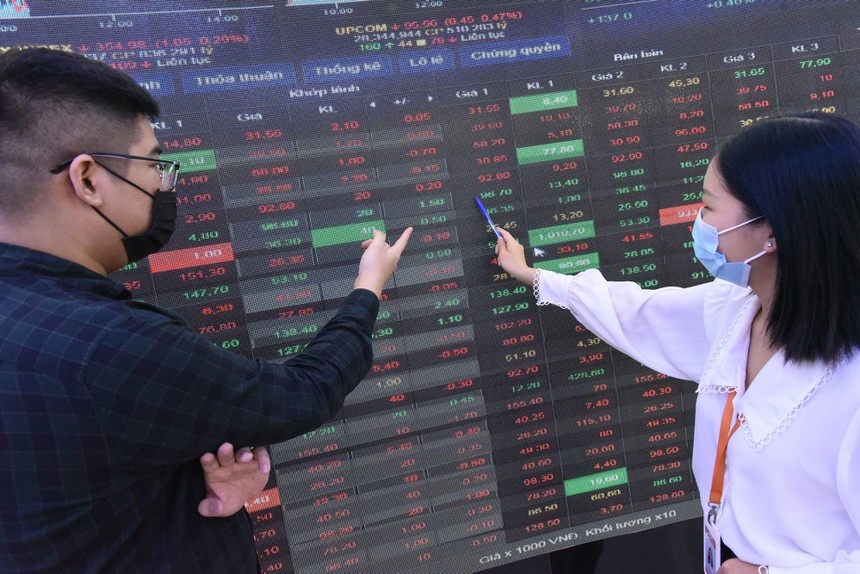Vietnam’s retail investors flock to stock markets
 |
| During lockdown, Vietnam's stock markets gained a great many so-called F0 investors |
In the latest survey by Dynam Capital and Indochina Research, half of the respondents were investors who have joined the stock market less than one year ago – known locally as F0 investors. The survey reached 425 participants, 193 of whom were fully validated and analysed. It reflects that local retail investors are mostly from Hanoi and Ho Chi Minh City, with a gender balance of 55 per cent female and 45 per cent male. Most respondents are white-collar office workers (53 per cent), with an average overall monthly personal income of $1,170 and an average portfolio value of $18,000. This place most retail investors surveyed in the medium-high income groups of the two key economic hubs.
The results highlight how stock investors allocate their investment, with 35 per cent having more than 50 per cent of their money invested in stocks and a similar proportion (35 per cent) investing up to $4,500.
Apart from stocks, bank deposits, real estate, and insurance products are the most used placements. Interestingly, the traditional gold is only chosen by 15 per cent while cryptocurrencies are now traded by two out of 10 investors.
The majority are very active, meaning they check the stock market index multiple times a day (84 per cent) and 54 per cent trade at least once a week.
Further analysis shows significant differences between F0 and F1+ investors. F0 investors have a lower average portfolio value ($11,000 against $24,500) and are more likely to surf stock with shorter positions held and have an overall lower expectation for return on their stock investment compared to more experienced F1 investors.
Positively, most investors (80 per cent) have registered gains in the past year, more among F1 investors (88 per cent), and 59 per cent are confident that the stock market will grow more than 5 per cent through the rest of this year, even in the face of the outbreak.
Six out of 10 (63 per cent) consider the stock market as a source of extra income, by far the most common response, significantly more among F0 investors (71 per cent). About 10 per cent consider the stock market as a retirement/long term investment plan.
These F0 individuals are far from alone. According to local media, 842,405 securities accounts were opened in the first eight months of this year, more than the number of new accounts in the last three years combined. Bank deposit interest rates remain low, driving increased interest in stocks. As of this June, there were 3.4 million individual stock accounts in Vietnam.
Vietnam has also been likened to Taiwan in terms of potential stock market growth. Currently around 3 per cent of Vietnam’s population has a retail stock brokerage account, similar to Taiwan’s figure in 1986. Taiwan went on to experience a decades-long stock market surge, and Vietnam now has many of the same economic fundamentals in place. The Vietnamese government also wants to see further growth, with goals to increase stock brokerage penetration to 5 per cent by 2025 and 10 per cent by 2030.
The growth in the stock market in Vietnam has been meteoric, the market value of publicly traded companies is close to $300 billion in 2021, up from $2 billion in 1996 when investment funds such as London-listed Vietnam Holding (VNH) commenced their activity. It has created wealth for some of the new domestic investors, and longer-term investors – such as those in VNH – have seen compound returns of 15 per cent per annum over the last decade, according to public data.
Yet, despite the growth and increased liquidity in the stock market (the second-highest in ASEAN), for foreign investors Vietnam is still classified as a frontier market. For the time being, at least, it will be local investors who dominate and benefit the most from its growth and development.
What the stars mean:
★ Poor ★ ★ Promising ★★★ Good ★★★★ Very good ★★★★★ Exceptional
Related Contents
Latest News
More News
- VIR hosting talk show on the stock market stability and sustainability (April 04, 2024 | 10:22)
- Stock market supported by diverse factors (March 14, 2024 | 16:46)
- SSC proposes new Information Disclosure System (March 04, 2024 | 09:09)
- Stock market offers promising opportunities as it enters bullish cycle (December 18, 2023 | 16:00)
- JB Securities Vietnam launches innovative securities trading platform Finavi (October 02, 2023 | 08:00)
- DNSE Securities takes lead in new account openings in Q2 (July 27, 2023 | 08:00)
- Major bourses to hail raft of fresh supplies (July 14, 2023 | 09:56)
- Securities firms falling short of business plans (November 24, 2022 | 21:35)
- Trading volumes increase in spite of money market jitters (September 28, 2022 | 10:00)
- Weighing stock market opportunities in H2 (September 21, 2022 | 19:21)

 Tag:
Tag:





















 Mobile Version
Mobile Version